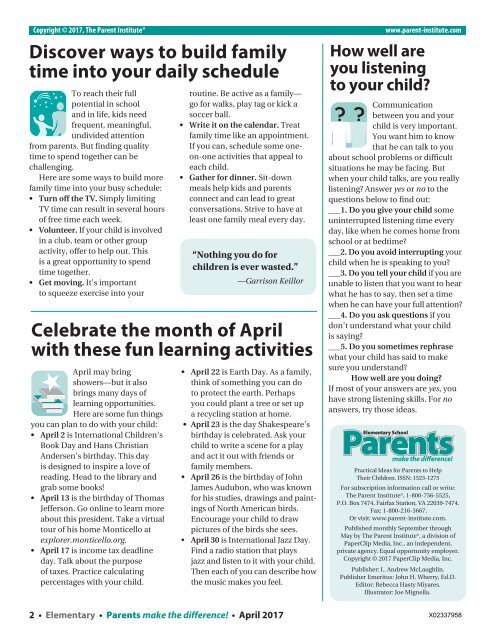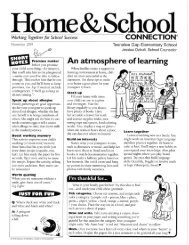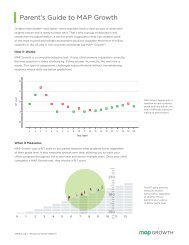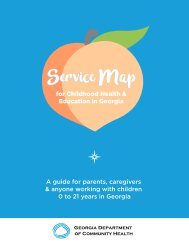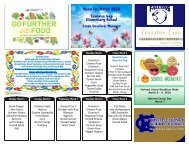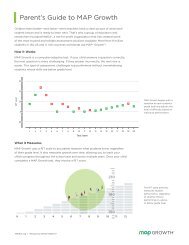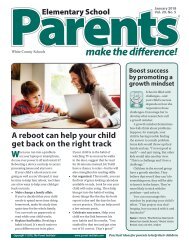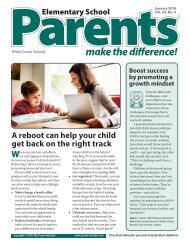elemapr17
You also want an ePaper? Increase the reach of your titles
YUMPU automatically turns print PDFs into web optimized ePapers that Google loves.
Copyright © 2017, The Parent Institute®<br />
Discover ways to build family<br />
time into your daily schedule<br />
To reach their full<br />
potential in school<br />
and in life, kids need<br />
frequent, meaningful,<br />
undivided attention<br />
from parents. But finding quality<br />
time to spend together can be<br />
challenging.<br />
Here are some ways to build more<br />
family time into your busy schedule:<br />
• Turn off the TV. Simply limiting<br />
TV time can result in several hours<br />
of free time each week.<br />
• Volunteer. If your child is involved<br />
in a club, team or other group<br />
activity, offer to help out. This<br />
is a great opportunity to spend<br />
time together.<br />
• Get moving. It’s important<br />
to squeeze exercise into your<br />
April may bring<br />
showers—but it also<br />
brings many days of<br />
learning opportunities.<br />
Here are some fun things<br />
you can plan to do with your child:<br />
• April 2 is International Children’s<br />
Book Day and Hans Christian<br />
Andersen’s birthday. This day<br />
is designed to inspire a love of<br />
reading. Head to the library and<br />
grab some books!<br />
• April 13 is the birthday of Thomas<br />
Jefferson. Go online to learn more<br />
about this president. Take a virtual<br />
tour of his home Monticello at<br />
explorer.monticello.org.<br />
• April 17 is income tax deadline<br />
day. Talk about the purpose<br />
of taxes. Practice calculating<br />
percentages with your child.<br />
routine. Be active as a family—<br />
go for walks, play tag or kick a<br />
soccer ball.<br />
• Write it on the calendar. Treat<br />
family time like an appointment.<br />
If you can, schedule some oneon-one<br />
activities that appeal to<br />
each child.<br />
• Gather for dinner. Sit-down<br />
meals help kids and parents<br />
connect and can lead to great<br />
conversations. Strive to have at<br />
least one family meal every day.<br />
“Nothing you do for<br />
children is ever wasted.”<br />
—Garrison Keillor<br />
Celebrate the month of April<br />
with these fun learning activities<br />
• April 22 is Earth Day. As a family,<br />
think of something you can do<br />
to protect the earth. Perhaps<br />
you could plant a tree or set up<br />
a recycling station at home.<br />
• April 23 is the day Shakespeare’s<br />
birthday is celebrated. Ask your<br />
child to write a scene for a play<br />
and act it out with friends or<br />
family members.<br />
• April 26 is the birthday of John<br />
James Audubon, who was known<br />
for his studies, drawings and paintings<br />
of North American birds.<br />
Encourage your child to draw<br />
pictures of the birds she sees.<br />
• April 30 is International Jazz Day.<br />
Find a radio station that plays<br />
jazz and listen to it with your child.<br />
Then each of you can describe how<br />
the music makes you feel.<br />
2 • Elementary • Parents make the difference! • April 2017<br />
www.parent-institute.com<br />
How well are<br />
you listening<br />
to your child?<br />
Communication<br />
between you and your<br />
child is very important.<br />
You want him to know<br />
that he can talk to you<br />
about school problems or difficult<br />
situations he may be facing. But<br />
when your child talks, are you really<br />
listening? Answer yes or no to the<br />
questions below to find out:<br />
___1. Do you give your child some<br />
uninterrupted listening time every<br />
day, like when he comes home from<br />
school or at bedtime?<br />
___2. Do you avoid interrupting your<br />
child when he is speaking to you?<br />
___3. Do you tell your child if you are<br />
unable to listen that you want to hear<br />
what he has to say, then set a time<br />
when he can have your full attention?<br />
___4. Do you ask questions if you<br />
don’t understand what your child<br />
is saying?<br />
___5. Do you sometimes rephrase<br />
what your child has said to make<br />
sure you understand?<br />
How well are you doing?<br />
If most of your answers are yes, you<br />
have strong listening skills. For no<br />
answers, try those ideas.<br />
make the difference!<br />
Practical Ideas for Parents to Help<br />
Their Children. ISSN: 1523-1275<br />
1046-0446<br />
For subscription information call or write:<br />
The Parent Institute ® , 1-800-756-5525,<br />
P.O. Box 7474, Fairfax Station, VA 22039-7474.<br />
Fax: 1-800-216-3667.<br />
Or visit: www.parent-institute.com.<br />
Published monthly September through<br />
May by The Parent Institute ® , a division of<br />
PaperClip Media, Inc., an independent,<br />
private agency. Equal opportunity employer.<br />
Copyright © 2017 PaperClip Media, Inc.<br />
Publisher: L. Andrew McLaughlin.<br />
Publisher Emeritus: John H. Wherry, Ed.D.<br />
Editor: Rebecca Hasty Miyares.<br />
Illustrator: Joe Mignella.<br />
®<br />
X02337958


